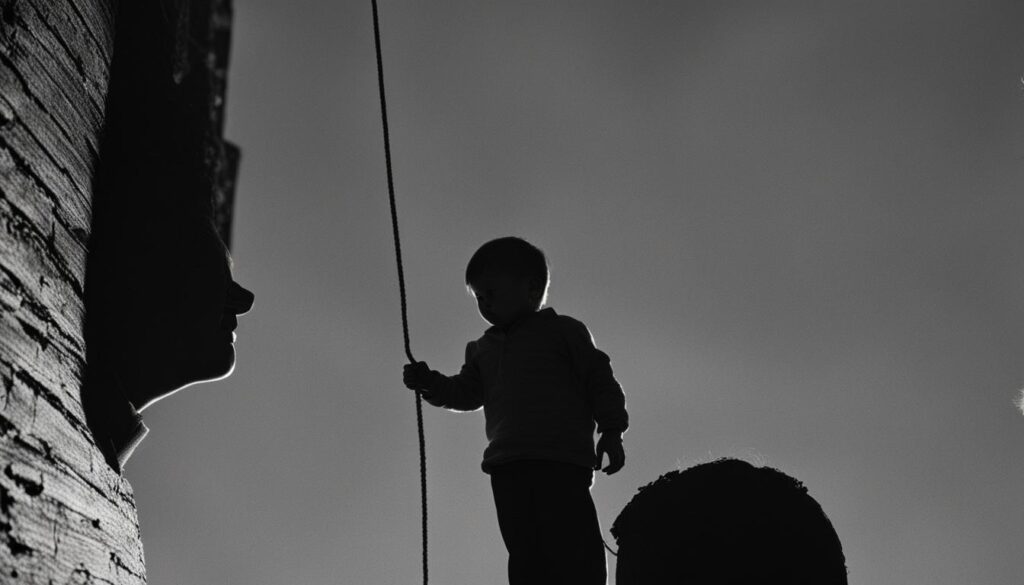Were you aware that approximately 2% of adults in the United States are diagnosed with Borderline Personality Disorder (BPD)? If your father is living with borderline personality disorder, you probably have experience with the difficulties and complexities that come with this type of relationship. Managing a relationship with a parent who has BPD necessitates utilizing specific strategies and coping mechanisms to navigate the intricacies of family dynamics, emotional regulation, and effective communication.
Key Takeaways:
- Setting boundaries is crucial when dealing with a borderline father.
- Practicing self-care is essential for your own well-being.
- Understanding BPD and its impact on family dynamics is key to navigating the relationship.
- Seeking professional support and therapeutic interventions can provide valuable guidance.
- Building a strong support system is important for your own emotional well-being.
Recognizing Borderline Personality Disorder in a Parent
Recognizing the signs of Borderline Personality Disorder (BPD) in a parent is crucial for understanding their behavior and seeking appropriate support.
BPD is characterized by emotional instability, intense fear of abandonment, impulsive behavior, unstable relationships, distorted self-image, and self-harming behaviors.
Understanding BPD in a parent can help us navigate the challenges that arise within the family dynamics. It allows us to develop empathy and compassion towards our parent’s struggles and fosters a better understanding of their emotional needs.
Emotional instability is a hallmark of BPD. Our parent may experience unpredictable mood swings, going from extreme highs to lows, which can be challenging for us to navigate and understand.
Fear of abandonment is another characteristic of BPD. Our parent may exhibit clingy behavior or become anxious and fearful when faced with the possibility of being left alone.
Impulsive behavior is common in individuals with BPD. Our parent may make impulsive decisions or engage in risky behaviors without considering the consequences, which can have a significant impact on our family’s stability.
Unstable relationships are also observed in individuals with BPD. Our parent may struggle to maintain healthy, long-term connections and may be quick to idealize or devalue others, leading to turmoil within our family unit.
A distorted self-image is another common trait of BPD. Our parent may have a low self-esteem and struggle with self-identity, which can affect their functioning as a parent and their interactions with us.
Self-harming behaviors may be present in individuals with BPD as a way to cope with emotional turmoil. It is essential to recognize these behaviors and offer support to our parent while prioritizing our own well-being.
By recognizing these signs of BPD in our parent, we can take steps towards understanding their condition and its impact on our family. This knowledge allows us to approach our parent’s behavior with compassion and seek appropriate support for ourselves and our parent.
The Impact of BPD
The understanding of how BPD affects a parent’s behavior is crucial in navigating the challenges that arise within the family dynamics. It allows us to develop empathy and compassion towards our parent’s struggles and fosters a better understanding of their emotional needs.
Recognizing the signs of Borderline Personality Disorder (BPD) in a parent is crucial for understanding their behavior and seeking appropriate support.
| Signs of BPD in a Parent | Description |
|---|---|
| Emotional Instability | Our parent may experience unpredictable mood swings, going from extreme highs to lows, which can be challenging for us to navigate and understand. |
| Fear of Abandonment | Our parent may exhibit clingy behavior or become anxious and fearful when faced with the possibility of being left alone. |
| Impulsive Behavior | Our parent may make impulsive decisions or engage in risky behaviors without considering the consequences, which can have a significant impact on our family’s stability. |
| Unstable Relationships | Our parent may struggle to maintain healthy, long-term connections and may be quick to idealize or devalue others, leading to turmoil within our family unit. |
| Distorted Self-Image | Our parent may have a low self-esteem and struggle with self-identity, which can affect their functioning as a parent and their interactions with us. |
| Self-Harming Behaviors | Our parent may engage in self-harming behaviors as a way to cope with emotional turmoil. It is essential to recognize these behaviors and offer support while prioritizing our own well-being. |
Coping Strategies for Dealing with a Parent with BPD
Coping with a parent who has Borderline Personality Disorder (BPD) can be challenging, but there are strategies that can help maintain a positive relationship with them while prioritizing our own mental health. Here are some coping strategies to consider:
1. Establishing Boundaries
Setting boundaries is essential when dealing with a parent with BPD. Clearly define what behaviors are acceptable and communicate them calmly and assertively. By establishing boundaries, we protect ourselves from emotional harm and maintain a healthier dynamic.
2. Practicing Self-Care
It’s crucial to prioritize our own well-being while supporting a parent with BPD. Engage in activities that bring us joy and relaxation, practice mindfulness or meditation, and ensure we have regular breaks for self-reflection. Taking care of ourselves allows us to be better equipped to handle the challenges that arise.
3. Seeking Professional Support
Don’t hesitate to reach out to professionals who specialize in BPD or mental health. Therapists, counselors, or support groups can provide guidance, validation, and coping strategies tailored to our unique situation. Seeking professional support can offer valuable insights and help us navigate this complex relationship.
4. Improving Communication
Effective communication is key to managing relationships with a parent who has BPD. Practice active listening, express ourselves clearly and calmly, and validate their emotions without enabling negative behaviors. Improving communication skills can lead to a more constructive and understanding dialogue.
5. Developing Understanding and Empathy
It is essential to educate ourselves about BPD and develop a deeper understanding of our parent’s struggles. By learning about the disorder, we can develop empathy and compassion, which can help us navigate their challenges with more patience and understanding.
6. Supporting a Parent with BPD
Supporting a parent with BPD involves being there for them while also prioritizing our boundaries and self-care. Offer encouragement, reassurance, and validation, and be mindful of our own limits. Finding a balance between support and self-care is crucial for maintaining our emotional well-being.
Remember, coping strategies may vary depending on individual circumstances, and what works for one person may not work for another. It’s important to explore different strategies and adapt them to our own needs and the specific dynamics of the relationship.

Grouport Offers BPD Group Support Online & DBT Skills Groups Online
At Grouport Therapy, we understand the challenges of coping with Borderline Personality Disorder (BPD). That’s why we offer online support groups that are specifically designed to provide guidance and help individuals manage their symptoms. Our support groups for BPD create a safe space where you can connect with others who are facing similar challenges, fostering a sense of belonging and understanding.
Our online group therapy sessions offer a virtual environment where you can share experiences, learn coping strategies, and gain valuable insights for navigating the complexities of BPD. Led by experienced therapists, these sessions focus on Dialectical Behavior Therapy (DBT), a highly effective approach for managing BPD symptoms and building a more fulfilling life.
By participating in our virtual group sessions, you can enhance your self-awareness, develop effective strategies for coping with BPD, and find the support you need to thrive. Our groups provide a confidential and empathetic space, ensuring that you can freely express your emotions and concerns without judgment.
Benefits of Joining Grouport’s BPD Support Groups:
- Connect with a community of individuals who understand the challenges of BPD
- Learn valuable coping skills from experienced therapists
- Enhance self-awareness and gain insights into your own emotions and behaviors
- Develop healthy strategies for managing BPD symptoms
- Receive support and validation from peers
- Create meaningful connections and build lasting relationships
“Grouport’s online support groups have been a lifeline for me. It’s incredible to have a community of people who truly understand what I’m going through. The therapists are amazing and the coping strategies I’ve learned have made a significant difference in my life.” – Sarah, Grouport member
Join Grouport Therapy’s online support groups and take the first step towards coping with BPD in a supportive and understanding community. Together, we can navigate the challenges of BPD and build a brighter future.

The Unique Challenges of Borderline Fathers
When it comes to borderline personality disorder (BPD), the challenges faced by borderline fathers differ from those faced by borderline mothers. As a borderline father, there are distinct difficulties that arise, including attachment issues, emotional volatility, competition for affection, and the role of secondary attachment object. These factors can significantly impact the father-child relationship and the overall well-being of the child.
Unlike borderline mothers who typically form a primary attachment with the child, borderline fathers often perceive their children as secondary attachment objects. This can lead to a sense of emotional distance and detachment between the father and the child. The child’s mother, usually the primary attachment object, becomes the focus of emotional investment and competition for affection.
This dynamic results in unique challenges within the father-child relationship. The child may experience difficulties in forming a secure attachment with the father, as well as a sense of emotional volatility. The father’s emotional state can be unpredictable, leading to confusion and instability for the child.
Furthermore, the competition for affection between the father and the child’s primary attachment object can create tension and conflict. The child may feel caught in the middle, uncertain of how to navigate the relationship and torn between the two figures of attachment.
To visually illustrate the challenges faced by borderline fathers, here is a table summarizing the key difficulties:
| Difficulties of Having a Borderline Father |
|---|
| Attachment issues |
| Emotional volatility |
| Competition for affection |
| Secondary attachment object |
It is important to recognize and address these challenges in order to create healthier dynamics within the father-child relationship. By understanding the impact of BPD on fathers and children, we can develop strategies and interventions to support both parties and promote emotional well-being.

Next, we will examine the impact of BPD on infants and toddlers, shedding light on how these challenges manifest during the early stages of a child’s development.
Impact of BPD on Infants and Toddlers
When it comes to Borderline Personality Disorder (BPD) and its impact on infants and toddlers, we need to consider the challenges faced by borderline fathers in bonding and connecting with their young children. Due to the emotional demands of parenting and their perception of the child as an obstacle to their primary attachment with the child’s mother, borderline fathers may struggle to establish a healthy bond.
The emotional instability often associated with BPD can lead to parental abandonment, leaving infants and toddlers without the consistent care and nurturing they need for healthy development. This can result in emotional instability for both the child and the father, creating further challenges in establishing a strong bond between them.
“Parental abandonment and emotional demands pose significant challenges in bonding between borderline fathers and their infants and toddlers.”
The emotional demands placed on borderline fathers can be overwhelming, leading them to withdraw from their parental responsibilities. This withdrawal can hinder the development of a secure attachment between father and child, as infants and toddlers rely on consistent emotional connection and caregiving to form healthy relationships.
In addition, the perception of the child as a barrier to the primary attachment with the mother can further strain the father-child relationship. Borderline fathers may view their children as competition for affection, causing them to become emotionally distant or even neglectful.
To better understand the impact of BPD on infants and toddlers, let’s take a closer look at the challenges they may face:
| Challenges | Impact on Infants and Toddlers |
|---|---|
| Parental abandonment | Emotional instability and difficulties in forming secure attachments |
| Emotional demands | Lack of consistent emotional support and caregiving |
| Challenges in bonding | Difficulties in establishing a healthy father-child relationship |

It is essential to recognize the unique challenges faced by infants and toddlers with borderline fathers and take appropriate steps to support their emotional well-being. By promoting awareness, understanding, and empathy, we can work towards creating a nurturing environment that fosters healthy bonding and development for these young children.
Borderline Fathers and Children
When it comes to parenting with Borderline Personality Disorder (BPD), fathers can present unique challenges. They often place unrealistic expectations on their children and expect them to prioritize their needs above all else. When these expectations are not met, these fathers may react with rejection and even abuse. This can create strained relationships and emotional distress for the child.
Borderline fathers may exhibit emotional volatility and struggle to understand their child’s perspective. Their unreasonable demands and lack of empathy can further contribute to the strain in the father-child relationship. It is important to recognize these dynamics and address them for the well-being of both the child and the father.
Setting priorities and establishing healthy boundaries becomes crucial in dealing with a borderline father. Children need to understand that their own needs and well-being matter just as much as their father’s. By prioritizing their own mental and emotional health, children can protect themselves from the negative effects of their father’s BPD and foster a healthier relationship.
“It is important to recognize these dynamics and address them for the well-being of both the child and the father.”
To illustrate the impact of borderline fathers’ expectations and behavior, let’s take a look at the following table:
| Challenges | Effects on Children |
|---|---|
| Unrealistic expectations | Feelings of inadequacy and constant pressure to please their father |
| Rejection and abuse | Emotional distress, low self-esteem, and fear of abandonment |
| Emotional volatility | Inconsistent and unpredictable environment, leading to anxiety and confusion |
It is essential for children of borderline fathers to recognize that these challenges are not their fault and that they have the right to set boundaries. Seeking support from trusted adults, such as other family members, teachers, or mental health professionals, can provide the necessary tools to navigate these complex relationships.
In the next section, we will explore the impact of having a borderline father on adult children and the challenges they may face when dealing with their parent’s BPD.

Borderline Fathers and Adult Children
Dealing with a borderline father can be challenging, and these challenges often persist into adulthood. Adult children may find themselves grappling with a range of issues as they navigate their relationship with their borderline father.
Maintaining Boundaries
One of the key challenges that adult children face is maintaining boundaries. Borderline fathers may struggle with respecting personal boundaries and may infringe upon their children’s autonomy. Adult children need to establish clear boundaries and communicate them assertively, emphasizing the importance of mutual respect.
Communication Challenges
Effective communication can be particularly difficult when dealing with a borderline father. These fathers may have volatile emotional states and may react strongly to perceived slights or criticisms. Adult children may need to develop specialized communication skills, such as using “I” statements and active listening, to navigate these challenges and minimize conflict.
Criticism and Blame
Borderline fathers may have a tendency to readily criticize and blame others, and adult children are no exception. Adult children may find themselves constantly subjected to their father’s criticism and blame, which can take a toll on their self-esteem and overall well-being. It’s crucial for adult children to develop resilience, recognize their own worth, and seek support from others who understand their experience.
Remember, your father’s criticism and blame is not a reflection of your worth. Surround yourself with a support system of friends and loved ones who uplift and affirm your value.
Victim Mentality
Another challenge that adult children of borderline fathers face is their father’s tendency to adopt a victim mentality. Borderline fathers may use emotional manipulation and abuse to deflect responsibility for their actions, casting themselves as the victims in their relationships. Adult children need to be aware of this dynamic and maintain their own emotional boundaries, avoiding being drawn into a cycle of blame and manipulation.
Dealing with a borderline father as an adult can be emotionally demanding, but it’s important to prioritize self-care and seek support. Remember that you are not alone, and there are resources available to help you navigate the complex dynamics of this relationship.

Healing and Recovery from a Borderline Father
Healing from the detrimental effects of a borderline father requires acknowledging the emotional damage inflicted by the relationship. Recognizing the impact is the first step in the journey towards recovery and creating a brighter future. Psychotherapy plays a crucial role in this healing process by providing individuals with the tools to set healthy boundaries, gain understanding of the abuse endured, and develop a stronger sense of self.

Through psychotherapy, individuals can work towards recognizing the patterns of dysfunction established during their upbringing and learn strategies to overcome them. This therapeutic intervention allows a space for introspection, validation of experiences, and the exploration of healthier coping mechanisms. With the guidance of a skilled therapist, individuals can rebuild their self-esteem, heal from past wounds, and break free from the negative influence of a borderline father.
Psychotherapy provides individuals with the tools to set healthy boundaries, gain understanding of the abuse endured, and develop a stronger sense of self.
Setting boundaries is crucial in the healing process as it empowers individuals to protect their emotional well-being and establish healthier relationships. By learning to recognize and assert their needs, individuals can create safe spaces where they are respected and valued. Setting boundaries with a borderline father may involve limiting contact, establishing clear expectations, and finding support from friends, family, or support groups.
Additionally, being the best son or daughter one can be under the circumstances is an important aspect of healing and recovery. This entails prioritizing self-care, engaging in activities that bring joy and fulfillment, and embracing personal growth. By focusing on their own well-being, individuals can break free from the cycle of dysfunction and create positive, fulfilling lives for themselves.
Psychotherapeutic Approaches for Healing from a Borderline Father
| Approach | Description |
|---|---|
| Dialectical Behavior Therapy (DBT) | A goal-oriented therapy that helps individuals regulate emotions, develop healthy coping mechanisms, and build interpersonal skills. |
| Cognitive-Behavioral Therapy (CBT) | A therapy focused on identifying and changing negative thought patterns and behaviors, promoting positive psychological wellness. |
| Psychodynamic Therapy | A therapy that explores the influence of past experiences on present behaviors and emotions, facilitating insight and healing. |
| Schema Therapy | A comprehensive approach that targets deeply rooted, maladaptive patterns and beliefs, promoting self-awareness and healing. |
| Group Therapy | A supportive setting where individuals can share experiences, gain validation, and learn from peers facing similar challenges. |
In conclusion, healing and recovery from a borderline father entail recognizing the emotional damage, engaging in psychotherapy to establish boundaries and develop self-understanding, and being the best version of oneself despite the challenging circumstances. Through these steps, individuals can overcome the negative impact of a borderline father and forge a path towards healing, growth, and a positive future.
Seeking Professional Help for Borderline Fathers
Borderline fathers can greatly benefit from seeking professional help to effectively manage their Borderline Personality Disorder (BPD) symptoms and improve their relationships with their children. Through therapy options, medication, and participation in support groups, fathers can access valuable resources and guidance that can positively impact their well-being and contribute to the overall family dynamics.
Therapy Options: Psychotherapy, such as Dialectical Behavior Therapy (DBT) or cognitive-behavioral therapy, can provide borderline fathers with the necessary tools and strategies to regulate their emotions, build healthier coping mechanisms, and strengthen interpersonal relationships. A qualified therapist can offer a safe and supportive environment to address the challenges associated with BPD and guide the father towards personal growth and positive change.
Medication: In some cases, medication prescribed by a psychiatric professional may be beneficial to manage the symptoms of BPD. Antidepressants, antipsychotics, or mood stabilizers may be utilized to address mood swings, impulsivity, or other associated difficulties. It is crucial for the father to consult with a healthcare provider to determine the most appropriate medication options and to ensure ongoing monitoring of their medication’s effectiveness.
Support Groups: Joining support groups specifically tailored for individuals with BPD can provide a sense of community, acceptance, and understanding. These groups create a space for fathers to share experiences, gain insights from others facing similar challenges, and learn valuable strategies for self-management and improved relationships. Online platforms, such as Grouport Therapy, offer convenient accessibility to virtual support groups, ensuring availability and connection from the comfort of one’s own home.
Encouraging a borderline father to seek professional help and providing ongoing emotional support can be pivotal in their journey towards well-being. By addressing their mental health needs and engaging in therapeutic interventions, fathers with BPD can enhance their emotional regulation, strengthen their bond with their children, and strive for healthier family dynamics.
Supporting Adult Children of Borderline Fathers
As adult children of borderline fathers, we may carry the weight of past trauma and struggle to establish healthy relationships. However, with the right support and self-care practices, we can embark on a journey of healing and create healthier connections in our lives.
Building a Support Network
One crucial aspect of our healing process is building a strong support network. Surrounding ourselves with understanding and empathetic individuals who have similar experiences can provide validation, comfort, and a sense of belonging. Seeking out support groups or online communities dedicated to adult children of borderline fathers can be immensely beneficial. These spaces offer a safe haven for sharing our stories, exchanging coping strategies, and fostering a sense of community.
Therapy Options
Therapy can be a powerful tool in our healing journey. By working with a qualified therapist who specializes in trauma and family dynamics, we can gain insights into the impact of our upbringing and develop effective coping mechanisms. Different therapy modalities like cognitive-behavioral therapy (CBT), dialectical behavior therapy (DBT), or trauma-focused therapy may be recommended based on our individual needs. It’s essential to explore these options and find a therapist who resonates with us.
Self-Care Tips
Practicing self-care is crucial in promoting our overall well-being and supporting our healing process. Here are some self-care tips that can help us nurture ourselves:
- Engage in activities that bring us joy and relaxation, such as hobbies, exercise, or creative outlets.
- Establish healthy boundaries to protect our emotional well-being and prioritize self-care.
- Practice mindfulness and self-reflection to cultivate self-awareness and emotional regulation.
- Seek out support from trusted friends or family members who understand our experiences.
- Engage in practices that promote physical and emotional wellness, such as meditation, journaling, or therapy.
By prioritizing self-care, we can create a foundation of resilience and strength to navigate the challenges that arise from our relationship with our borderline fathers.
Healing from Past Trauma
Healing from past trauma takes time and effort, but it is a journey worth embarking on. Acknowledging the impact of our upbringing and the pain we have endured is an essential first step. Through therapy, self-reflection, and personal growth, we can make peace with our past, learn to forgive, and cultivate a sense of self-worth and empowerment.
Remember, healing is a deeply personal process, and it’s important to be patient and compassionate with ourselves as we navigate our unique journeys of healing and growth.

By building a support network, exploring therapy options, practicing self-care, and acknowledging our past trauma, we can take steps towards healing and create healthier relationships in our lives. We have the power to reclaim our narrative and build a brighter future for ourselves.
Conclusion
Dealing with a borderline father can be a challenging journey, but with compassion, understanding, and the right strategies, we can navigate this complex relationship and find healing and recovery. One of the key strategies is setting clear boundaries to protect our well-being and establish healthier dynamics. By clearly communicating our needs and limits, we can create a safer space for ourselves and foster healthier interactions.
Practicing self-care is another crucial aspect of coping with a borderline parent. Taking time for ourselves, engaging in activities that bring us joy, and prioritizing our mental and emotional well-being allows us to recharge and build resilience. Self-care enables us to navigate the challenges more effectively and maintain a sense of balance.
Seeking professional help is essential on this journey. Therapeutic interventions with qualified professionals can provide us with the necessary guidance, support, and tools to navigate the complexities of the relationship. They can help us understand the root causes, develop coping strategies, and facilitate healing and growth. Through therapy, we can gain insights, build resilience, and establish healthier patterns and behaviors.
Ultimately, it is important to build healthy relationships beyond our relationship with a borderline parent. By surrounding ourselves with supportive individuals who understand and validate our experiences, we can find solace and a sense of belonging. Cultivating healthy connections fosters personal growth, provides emotional nourishment, and contributes to a brighter future for ourselves and our families.
FAQ
What are some coping strategies for dealing with a borderline father?
Some coping strategies for dealing with a borderline father include setting clear boundaries, practicing self-care, and seeking professional support.
How can I recognize Borderline Personality Disorder in a parent?
Borderline Personality Disorder in a parent is characterized by emotional instability, intense fear of abandonment, impulsive behavior, unstable relationships, distorted self-image, and self-harming behaviors.
What are some coping techniques for dealing with a father with Borderline Personality Disorder?
Coping techniques for dealing with a father with Borderline Personality Disorder include improving communication skills, developing understanding and empathy, and providing support to the parent with BPD.
Are there any online support groups available for individuals coping with Borderline Personality Disorder?
Yes, Grouport Therapy offers online support groups specifically designed for individuals coping with BPD. These groups provide a space for individuals to connect with others facing similar challenges and learn valuable coping skills.
What are the unique challenges of having a borderline father?
Some unique challenges of having a borderline father include difficulties with attachment, emotional volatility, and competition for affection with their primary attachment object.
How does Borderline Personality Disorder impact infants and toddlers?
Borderline fathers may struggle to bond with infants and toddlers due to the emotional demands of parenting and their perception of the child as an obstacle to their primary attachment with the child’s mother.
How does Borderline Personality Disorder affect the relationship between borderline fathers and children?
Borderline fathers often have unrealistic expectations of their children and may react with rejection and abuse when their expectations are not met. This can lead to strained relationships and emotional distress for the child.
What challenges do adult children face in their relationship with a borderline father?
Adult children of borderline fathers may face difficulties maintaining boundaries, navigating communication challenges, and dealing with their father’s criticism and blame.
How can healing and recovery be achieved from a relationship with a borderline father?
Healing and recovery from a relationship with a borderline father involve recognizing the emotional damage caused by the relationship, seeking psychotherapy to set boundaries and gain understanding, and working towards self-healing and creating a positive future.
What professional help is available for borderline fathers?
Borderline fathers can benefit from seeking professional help such as therapy options, medication, and support groups to manage their BPD symptoms and improve their relationship with their children.
How can adult children of borderline fathers receive support in healing from past trauma?
Adult children of borderline fathers can receive support in healing from past trauma by building a support network, seeking therapy options, practicing self-care, and acknowledging the impact of their upbringing.
What is the general guidance for coping with a borderline father?
Coping with a borderline father requires strategies such as setting boundaries, practicing self-care, seeking professional help, and building healthy relationships to create a brighter future.









